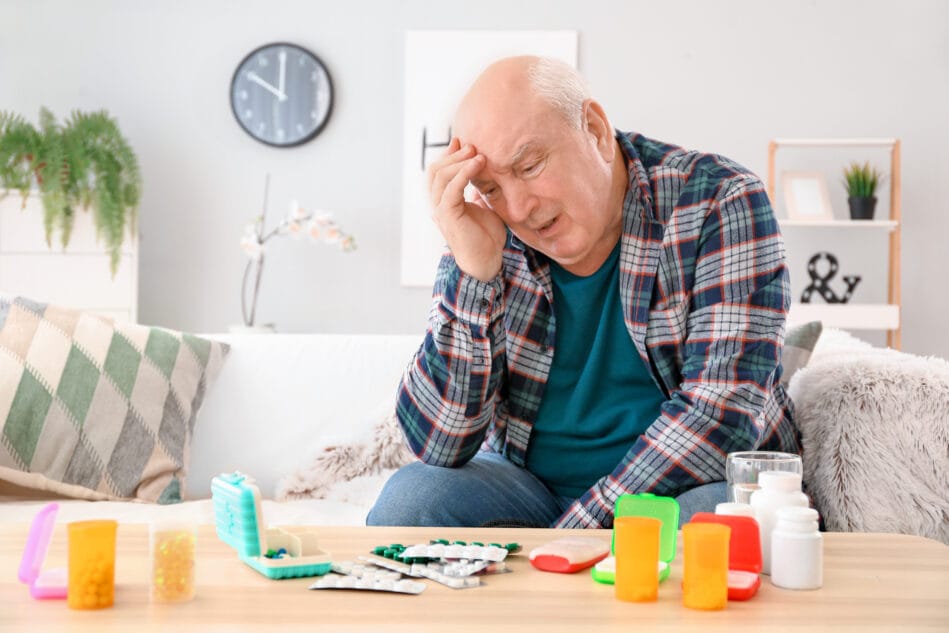When Beverly Wilkerson, 58, Sherman Oaks, CA, woke up with a pounding headache and jaw pain last summer, she popped two Aleve. (The recommended dosage is one at a time.) She forgot to take water and food with the pills. Later on, she took two more, again forgetting the water and food.
Suffering abdominal distress during the night, she went to the emergency room, where she was diagnosed with a bleeding ulcer. “It was undoubtedly caused by taking the pills without enough food in my stomach, or water to follow. I ended up with hours in the ER, several hundred dollars over my insurance, days of discomfort, a required follow-up colonoscopy – all because I took two pills above the dosage,” Wilkerson reports. “I would love this message to be shared, as I think the use of NSAIDs (nonsteroidal anti-inflammatory drugs) is taken way too cavalierly.”
Jump to: Beta-Blockers | Blood Thinners | NSAIDs | SSRIs | Statins
Most seniors routinely take several medications to deal with age-related health issues. These drugs, however, are not without side effects when taken alone or they may interact negatively with other drugs. Even more concerning is the fact that some of these drugs have the potential to worsen another co-existing condition. (See When Medications Counteract Each Other in Seniors.) The American Geriatrics Society reports in its updated Beers Criteria for Potentially Inappropriate Medication Use – a source that identifies medications with risks that may be greater than their benefits for people 65 and older – that “the total estimated healthcare expenditures related to the use of potentially inappropriate medications was $7.2 billion.”
“Prescribing for seniors is complicated because they may be taking many medications (self-medicated or prescribed) including nutraceuticals [nutrients, dietary supplements and herbal products] and vitamins. In addition, the way seniors metabolize medications is different than younger people. Some liver metabolism and kidney function change with age, which means the medications stay in the body longer,” explains Joyce Fogel, MD, Chief, Geriatric Medicine, Department of Medicine, Mount Sinai Beth Israel, New York.
The best way to deal with side effects is to avoid having them in the first place: Make sure you understand how, when, and for how long you should take the medication. In general, you should be taking the minimal dosage, as prescribed by your doctor and slowly elevate it. “Start low, go slow until you get the effect you want,” says Dr. Fogel. Also, it’s a good idea to take your medications at the same time every day so you get into a routine, and use a medicine dispenser to avoid confusion.
When prescribed something new, it’s important to ask your doctor the following questions:
- When and how you should take it
- What you should do if you miss a dose
- Possible interactions with other drugs, vitamins or supplements you’re taking
- Whether there are any specific instructions about foods to avoid or alcohol consumption while you are taking the medication
- Whether you need to be weaned off the medication gradually or if you can stop taking the medication abruptly
- For approximately how long you will need to stay on the medication
- Side effects of the medication or warning signs of a drug interaction to watch for.
Here’s important information to keep in mind about potential side effects of 5 of the drugs most commonly taken by seniors:
1. Beta-Blockers
Prescribed for: High blood pressure and hypertension
Names: Brand names are in parentheses. Drugs include acebutolol (Sectral), atenolol (Tenormin), bisoprolol (Zebeta), metoprolol (Lopressor, Toprol-XL), nadolol (Corgard), propranolol (Inderal LA, InnoPran XL
Dosing: Take with food. However, nutritional supplements such as CoQ-10 may also decrease blood pressure, causing blood pressure to drop too low.
Possible side effect: Beta-blockers work by slowing the heart rate, but sometimes they can make your heart beat too slowly. Pay attention if you suddenly become exhausted or confused. Some can also cause depression or worsen asthma symptoms. (Beta-blockers increase the risk of bronchospasm.)
What to do: In February, the Eighth Joint National Committee released new, relaxed blood pressure guidelines; if your blood pressure is on the border of being too high, discuss your new medication needs with your physician. If you remain on the medication, call your doctor immediately if you feel your heart is going too slow or your asthma is not properly controlled. For depression, talk with your doctor about adjusting the dose or switching to a different medicine.
2. Blood Thinners
Prescribed for: Some types of heart or blood vessel disease. They reduce the risk of heart attacks or strokes by diminishing the blood’s clotting factor.
Names: Anticoagulants such as heparin or warfarin (Coumadin) or antiplatelets such as aspirin.
Dosing: Take with food. However, foods containing vitamin K (i.e., green leafy vegetables) lessen the effect of the drug. Also, herbals such as vitamin E, gingko, garlic and ginseng can increase the risk of internal bleeding. Caution should be taken with the CoQ-10 supplement as it can increase the risk of blood clots.
Possible side effects: Abnormal or uncontrolled bleeding.
What to do: Seek medical attention immediately if you have black, tarry stools, prolonged bleeding from an injury or nose bleed, red or dark brown urine, or if you vomit blood.
3. NSAIDS (Nonsteroidal Anti-Inflammatory Drugs)
Prescribed for: Pain, inflammation, fever
Names: Most commonly used are ibuprofen (Motrin), aspirin (Bayer, Excedrin), naproxen (Aleve, Naprosyn). The FDA has a list of NSAIDS with additional medical information.
Dosing: Take with food and water. Follow dose instructions.
Possible side effects: Indigestion, ulcers, bleeding in stomach or colon, high blood pressure.
What to do: According to the American Geriatrics Society, if you have a history of ulcers or are over the age of 75, ask your doctor about protecting your stomach when taking NSAIDs with a prescription medication such as misoprostol (Cytotec) or a proton pump inhibitor such as omeprazole (Prilosec). But be aware that these drugs may also cause side effects. Don’t use NSAIDs with aspirin or blood thinners because you may increase your risk of bleeding.
4. SSRIs (Selective Serotonin Reuptake Inhibitors)
Prescribed for: Depression
Names: citalopram (Celexa), escitalopram (Lexapro), fluoxetine (Prozac), paroxetine (Paxil, Pexeva), sertraline (Zoloft)
Dosing: Take with food to minimize gastric upset. Timing depends on the type: Some SSRIs cause fatigue so are better taken before bedtime. Others, though, are stimulating, so should be taken in the morning. Ask your doctor or pharmacist which one you are taking, and then see which time works best for you.
Possible side effects: Weight gain, gastric distress, dizziness, fatigue, sexual dysfunction, irregular heartbeat. If you suddenly stop taking your medication without tapering off, you risk withdrawal symptoms such as sensations of electric shocks in your head, dizziness, nausea, insomnia and confusion.
What to do: Dr. Fogel recommends that patients get a baseline EKG before starting an SSRI regimen in case your heartbeat is affected. The other side effects may go away after a while as your body adjusts. If not, call your doctor to discuss adjusting the dose or trying a different type of antidepressant. If you wish to stop treatment, talk with your physician about gradually reducing your dose in a safe way. Avoid alcohol: It can make your depression worse and override the effect of the SSRI. It also will interact with the SSRI and make you overly confused and drowsy.
5. Statins
Prescribed for: High cholesterol
Names: Some of the most popular are atorvastatin (Lipitor), rosuvastatin (Crestor) and simvastatin (Zocor). If taking simvastatin, make certain it is less than 80mg, per FDA guidelines. Consumer Reports has a free PDF called Evaluating Statin Drugs to Treat High Cholesterol and Heart Disease updated in March 2014. New treatment guidelines may mean an increase of millions of seniors taking statins. Among men 60 to 75, the percentage could jump as high as 87 percent — up from 30 percent; women in the same age category may increase to 54 percent — from 21 percent.
Dosing: Take with food to minimize abdominal problems. Some people feel better if they take their medication at night instead of the morning. Don’t eat grapefruit – it increases your risk of side effects from the statins, from mild muscle and joint pain to severe muscle fiber breakdown and kidney failure.
Possible side effects: Muscle weakness and inflammation, elevation of liver function enzymes, gastric distress. Very important: If you are taking statins, avoid erythromycin and chlarithromycin. There is a risk that both can increase the concentration of the statin in your blood stream, leading to muscle or kidney damage, possibly death. If you need an antibiotic, use azithromycin instead.
What to do: If you are having muscle problems or stomach issues, contact your doctor immediately. He or she can adjust the dosage or prescribe a different medication. Go for a liver function test periodically – your doctor will tell you the right schedule for you. “Don’t forget non-pharmacological approaches, such as low-fat and heart-healthy eating, and exercise, which can allow you to either lower the dose or forgo the medication altogether,” says Dr. Fogel. Most people who go off of statins do so because of side effects. A small percent return to try statins a second time and studies show a high percent have a better time managing the side effects the second time. For more in-depth information on statins, see Statins: How Safe Are These Life-Savers?






